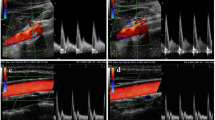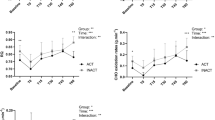Abstract
Purpose
Taking a short rest after lunch suppresses increases in blood flow to the digestive organs and maintains blood flow to the brain in the afternoon, possibly providing beneficial effects in preventing post-prandial drowsiness. The present study investigated sex-dependent influences on changes in hemodynamics produced by taking a short rest after lunch.
Methods
Subjects comprised 20 healthy young adults (10 men, 10 women; mean age 21 ± 1 years). Doppler sonography was performed to measure blood flow in the superior mesenteric artery (SMA) and common carotid artery (CCA) before and after lunch every hour on each day, with and without a 15-min rest with eyes closed after lunch. Blood pressure and heart rate (HR) were also measured.
Results
For both men and women, peak systolic velocity (PSV) in the SMA was suppressed by taking a rest. PSV in the CCA in men was increased at 0.5 h after lunch in the resting condition but was decreased in the non-resting condition (median 109%, interquartile range [IQR] 102–120% vs. median 98%, IQR 90–107%; P = 0.037). No such differences were observed in women. Although post-prandial increases in HR were observed in women, a similar increase was only found for men in the resting condition.
Conclusion
An increase in CCA blood flow was observed only in men. The present study suggests that a short rest after lunch could better promote the maintenance of blood flow to the brain in men than in women.




Similar content being viewed by others
Data availability
The datasets that support the findings of this study are available in the supplementary material.
Abbreviations
- BP:
-
Blood pressure
- CCA:
-
Common carotid artery
- DBP:
-
Diastolic blood pressure
- EDV:
-
End-diastolic velocity
- IQR:
-
Interquartile range
- MV:
-
Mean velocity
- PSV:
-
Peak systolic velocity
- SBP:
-
Systolic blood pressure
- SMA:
-
Superior mesenteric artery
References
Brokaw K, Tishler W, Manceor S, Hamilton K, Gaulden A, Parr E, Wamsley EJ (2016) Resting state EEG correlates of memory consolidation. Neurobiol Learn Mem 130:17–25
Daaloul H, Souissi N, Davenne D (2019) Effects of napping on alertness, cognitive, and physical outcomes of karate athletes. Med Sci Sports Exerc 51:338–345
Dauzat M, Lafortune M, Patriquin H, Pomier-Layrargues G (1994) Meal induced changes in hepatic and splanchnic circulation: a noninvasive Doppler study in normal humans. Eur J Appl Physiol Occup Physiol 68:373–380
Dewar M, Alber J, Butler C, Cowan N, Della Sala S (2012) Brief wakeful resting boosts new memories over the long term. Psychol Sci 23:955–960
Dewar M, Alber J, Cowan N, Della Sala S (2014) Boosting long-term memory via wakeful rest: intentional rehearsal is not necessary, consolidation is sufficient. PLoS One 9:e109542
Genzel L, Kiefer T, Renner L, Wehrle R, Kluge M, Grözinger M, Steiger A, Dresler M (2012) Sex and modulatory menstrual cycle effects on sleep related memory consolidation. Psychoneuroendocrinology 37:987–998
Harnish MJ, Greenleaf SR, Orr WC (1998) A comparison of feeding to cephalic stimulation on postprandial sleepiness. Physiol Behav 64:93–96
Humiston GB, Wamsley EJ (2018) A brief period of eyes-closed rest enhances motor skill consolidation. Neurobiol Learn Mem 155:1–6
Ishizeki A, Kishino T, Ogura S, Kuga H, Masai Y, Harashima K, Nakajima S, Otaki J, Ohnishi H, Watanabe T (2019) Influence of breakfast on hemodynamics after lunch—a sonographic evaluation of mesenteric and cervical blood flows. Clin Physiol Funct Imaging 39:226–229
Kapás L, Obál F Jr, Krueger JM (1993) Humoral regulation of sleep. Int Rev Neurobiol 35:131–160
Lau EYY, McAteer S, Leung CNW, Tucker MA, Li C (2018) Beneficial effects of a daytime nap on verbal memory in adolescents. J Adolesc 67:77–84
Lloyd HM, Green MW, Rogers PJ (1994) Mood and cognitive performance effects of isocaloric lunches differing in fat and carbohydrate content. Physiol Behav 56:51–57
MacDonald KJ, Lockhart HA, Storace AC, Emrich SM, Cote KA (2018) A daytime nap enhances visual working memory performance and alters event-related delay activity. Cogn Affect Behav Neurosci 18:1105–1120
Monrroy H, Borghi G, Pribic T, Galan C, Nieto A, Amigo N, Accarino A, Correig X, Azpiroz F (2019) Biological response to meal ingestion: gender differences. Nutrients 11:702
Nakao H, Kashiwakura C, Shibasaki S, Harashima K, Nakajima S, Ohnishi H, Watanabe T, Kishino T (2022) Possible effects of short rest after lunch on hemodynamics in the afternoon. Eur J Appl Physiol 122:523–530
Orr WC, Shadid G, Harnish MJ, Elsenbruch S (1997) Meal composition and its effect on postprandial sleepiness. Physiol Behav 62:709–712
Parker DR, Carlisle K, Cowan FJ, Corrall RJ, Read AE (1995) Postprandial mesenteric blood flow in humans: relationship to endogenous gastrointestinal hormone secretion and energy content of food. Eur J Gastroenterol Hepatol 7:435–440
Rubinstein EH (1972) Postprandial drowsiness. JAMA 222:703
Sabbá C, Ferraioli G, Genecin P, Colombato L, Buonamico P, Lerner E, Taylor KJ, Groszmann RJ (1991) Evaluation of postprandial hyperemia in superior mesenteric artery and portal vein in healthy and cirrhotic humans: an operator-blind echo-Doppler study. Hepatology 13:714–718
Sattari N, McDevitt EA, Panas D, Niknazar M, Ahmadi M, Naji M, Baker FC, Mednick SC (2017) The effect of sex and menstrual phase on memory formation during a nap. Neurobiol Learn Mem 145:119–128
Taourel P, Perney P, Dauzat M, Gallix B, Pradel J, Blanc F, Pourcelot L, Bruel JM (1998) Doppler study of fasting and postprandial resistance indices in the superior mesenteric artery in healthy subjects and patients with cirrhosis. J Clin Ultrasound 26:131–136
Waaler BA, Eriksen M (1992) Post-prandial cardiovascular responses in man after ingestion of carbohydrate, protein or fat. Acta Physiol Scand 146:321–327
Wamsley EJ (2019) Memory consolidation during waking rest. Trends Cogn Sci 23:171–173
Wells AS, Read NW, Uvnas-Moberg K, Alster P (1997) Influences of fat and carbohydrate on postprandial sleepiness, mood, and hormones. Physiol Behav 61:679–686
Williams CM (2004) Lipid metabolism in women. Proc Nutr Soc 63:153–160
Acknowledgements
This work was supported by a research fund from Kyorin University Faculty of Health Sciences (Grant no. R401010001).
Author information
Authors and Affiliations
Contributions
SS conducted data acquisition, performed statistical analyses, and wrote the manuscript. TK contributed to the conception and design of the study, and wrote the manuscript. YS, KH, and KS provided suggestions during the study process. HO revised the manuscript. TW gave advice on the study and manuscript. All authors approved the final version of the manuscript.
Corresponding author
Ethics declarations
Conflict of interest
The authors have no conflict of interest.
Additional information
Communicated by Massimo Pagani.
Publisher's Note
Springer Nature remains neutral with regard to jurisdictional claims in published maps and institutional affiliations.
Supplementary Information
Below is the link to the electronic supplementary material.
Rights and permissions
Springer Nature or its licensor (e.g. a society or other partner) holds exclusive rights to this article under a publishing agreement with the author(s) or other rightsholder(s); author self-archiving of the accepted manuscript version of this article is solely governed by the terms of such publishing agreement and applicable law.
About this article
Cite this article
Shibasaki, S., Kishino, T., Sei, Y. et al. Sex-dependent impact of a short rest after lunch on hemodynamics as assessed by Doppler sonography. Eur J Appl Physiol 124, 873–880 (2024). https://doi.org/10.1007/s00421-023-05316-y
Received:
Accepted:
Published:
Issue Date:
DOI: https://doi.org/10.1007/s00421-023-05316-y




